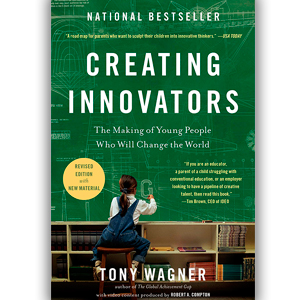
Less is More: A Review of Creating Innovators
 Tony Wagner, author of Creating Innovators, is upfront about how his book wasn’t intended to offer parents advice; rather, he hoped by focusing on a couple of key questions, such as intrinsic motivation and risk taking, he could help parents and educators see how innovators evolve. For this book, Wagner interviewed parents and innovators alike in order to illustrate what it takes to raise a child into an innovative adult. Therefore, the majority of Creating Innovators is anecdotes. Through powerful tales of STEM and Social innovators – like Jodie Wu, who designed an affordable maize-sheller for use in Tanzania fashioned from a bike and Zander Srodes, a young environmentalist who wrote a book at age eleven about sea turtles that was translated into six different language – Wagner convincingly conveyed why I need to nurture my children’s creative impulses.
Tony Wagner, author of Creating Innovators, is upfront about how his book wasn’t intended to offer parents advice; rather, he hoped by focusing on a couple of key questions, such as intrinsic motivation and risk taking, he could help parents and educators see how innovators evolve. For this book, Wagner interviewed parents and innovators alike in order to illustrate what it takes to raise a child into an innovative adult. Therefore, the majority of Creating Innovators is anecdotes. Through powerful tales of STEM and Social innovators – like Jodie Wu, who designed an affordable maize-sheller for use in Tanzania fashioned from a bike and Zander Srodes, a young environmentalist who wrote a book at age eleven about sea turtles that was translated into six different language – Wagner convincingly conveyed why I need to nurture my children’s creative impulses.
Wagner argues, “’Tiger moms’ such as Amy Chua don’t believe in play and won’t allow their children to fail,” and “Helicopter parents [who] indulge and insulate their children from failure at all costs” are doing little to produce innovators. If you want your child to develop a passion for something, you must start by encouraging play. Wagner is quick to clarify that that’s not to say kids don’t need limits because they do, but as Semyon Dukach of Global Cycle Solutions explains, “Too much of teaching them to be obedient can kill the creative impulse. The challenge is to balance respect for authority with constructive engagement and constructive rebellion.”
According to Wager, parents of innovators are unanimous in terms of one thing: less is more. “Fewer toys, and toys that encouraged imagination and invention, were seen as essential.” LEGOs and K’Nex were popular toys for innovation, but Wagner also includes anecdotes from parents, whose children enjoyed cardboard boxes for hours on end. What Wagner is really clear about is that “The ‘less is more’ philosophy was also reflected in these parents’ views on technology and screen time.” Wagner explains that the parents resisted buying their children electronic devices, keeping computers and televisions out of children’s bedrooms. I realize during the summer time it can be difficult to limit screen time, but the reality is that the creative mind doesn’t typically kick in until it gets bored.
Finally, Wagner maintains, the parents viewed reading as play. Many of them required an hour of reading daily with children choosing their own titles. The point being to offer an alternative to schools, allowing kids to move at their own pace and reading what most interests them. Wagner explains that in his experience, “The discipline of reading develops the muscles of concentration as well as the habit of self-motivated learning.” As an English teacher of 22 years, I concur. (Have you signed your kids up for summer reading yet?)
Wagner recognizes the difficulties in what some might see as a different approach to parenting. He points out how parents of innovators never said raising them was easy. Wagner claims, “Dealing with their children’s schools, creating space to let their children fail, and being ‘different’ parents were recurring themes in my conversations.” For example, there is often a conflict between “learning for a test or a grade versus learning as an expression of their children’s intrinsic interests.” But according to Wagner, we “different” parents must stay the course.
Wagner explains being a parent of an innovator requires confidence and courage. He writes, “Ultimately, to parent in the ways that I have described requires trust: First, trust in yourself as a parent. Then, trust in your child.” As far as Wagner is concerned the future of innovation depends on our deeper understanding of the importance of innovation. We need to stop seeing learning as such a passive experience. Children are not ours to “fill up” with knowledge. Rather, according to Wagner, we need to focus on developing a set of skills – such as solving a problem, creating a product, or generating a new understanding. That’s why Pultizer Prize winning author and journalist Thomas Friedman believes, “CQ (curiosity) plus PQ (passion) is greater than IQ.”
So let your children dabble in a variety of things this summer. Stop pushing for early mastery. And resist the temptation to schedule every moment of your child’s day. If you have any doubts along the way, read Creating Innovators by Tony Wagner; for as he explains, “Increasingly in the twenty-first century, what you know is far less important than what you can do with what you know.”
Need a refresher on why it’s good to limit screen time. Click here to read “Not. So. Much: Why Limiting Screen Time is More Important than Ever.”
Click here to learn more about Jodie Wu’s company, Global Cycle Solutions.
Click here to listen to Zander Srodes TED talk for teens.
Follow @WinterhalterV on Twitter for updates on blog posts or like Parenting by the Book on Facebook.






